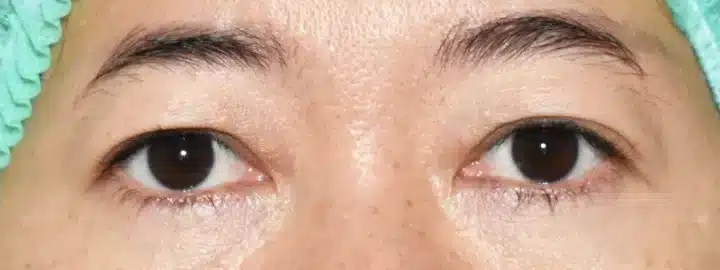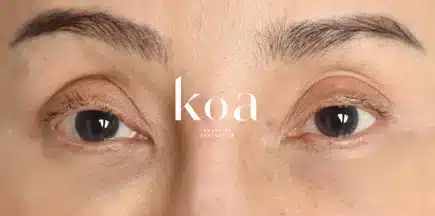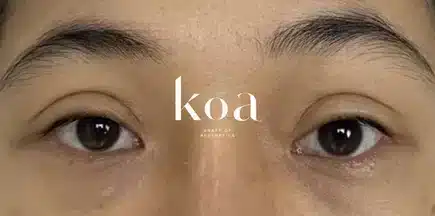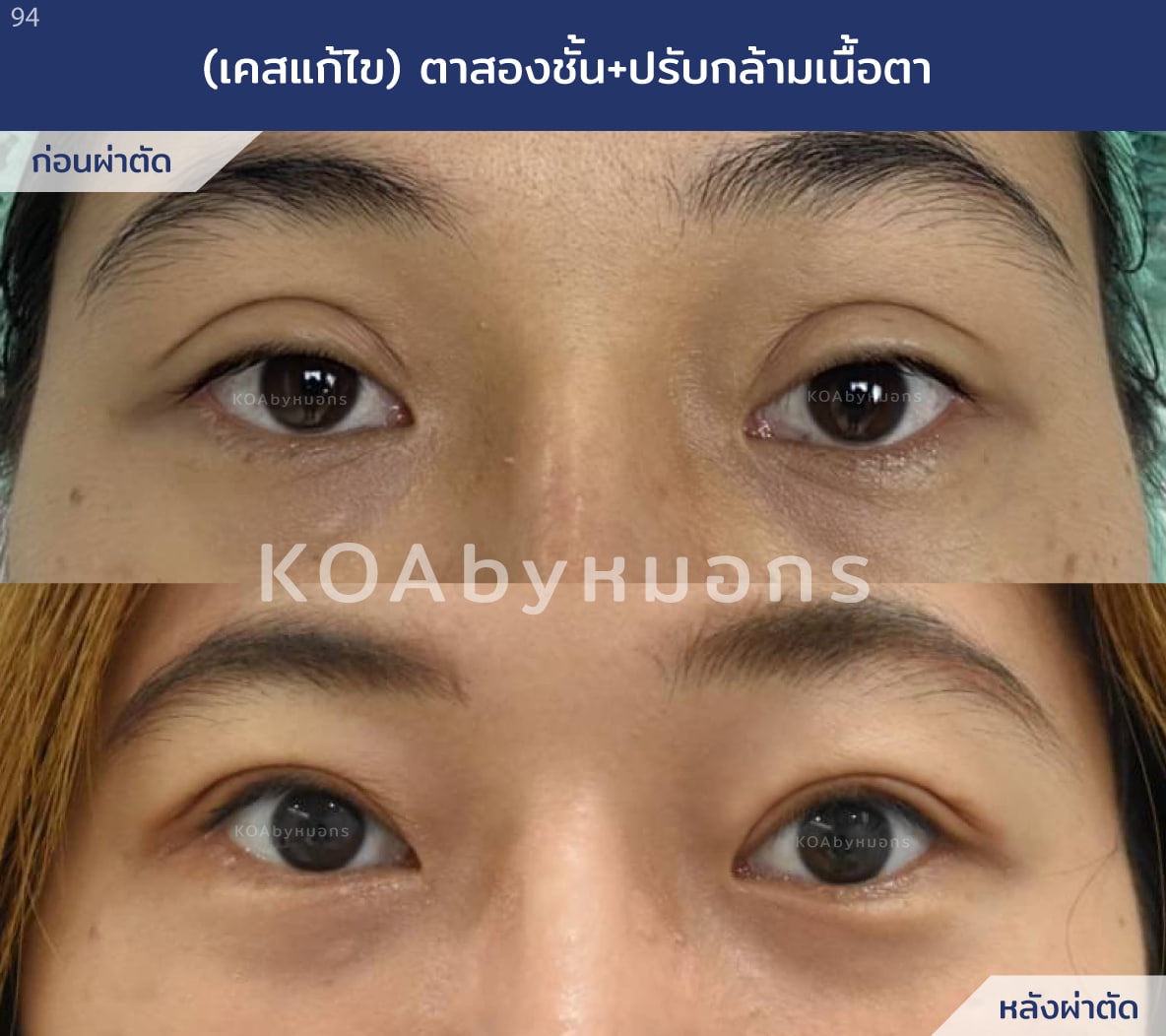All You Need to Know About Revision Eyelid Surgery by Ophthalmologist
At times, undergoing double eyelid surgery or other eyelid procedures such as eye bag removal or eyelid lift may not yield the desired results or could lead to various complications. These can affect eyelid function, aesthetics, and mental health, prompting a desire for corrective measures. In this article, Koa Clinic would like to introduce revision eyelid surgery procedures and recommend the best options to achieve optimal outcomes.
Challenges of Revision Eyelid Surgery

In any surgery, especially when performed multiple times, the complexity increases significantly with each subsequent procedure. This holds true for revision eyelid surgeries as well. The following factors contribute to the heightened complexity of revision eyelid surgery.
1. Soft Tissue Surrounding the Eye
The eye is a relatively small organ comprised mostly of soft tissues intricately layered. Performing surgery in this delicate area requires meticulous precision. In cases of prior eyelid surgeries, the body will develop fibrosis (unhealthy tissue) to compensate and recover for the loss of previous healthy tissue. The most important aspect of revision eyelid surgery is the adequate and careful removal of fibrosis before proceeding to other steps. Due to this, experienced handling is paramount to avoid damage to delicate vital tissues such as muscles and blood vessels, which becomes more challenging with each successive procedure. (The more surgeries, the higher the fibrosis, and the lower the success rate.)
Additionally, cutting excess tissue, like eyelid skin, too much can complicate the procedure and increase the risk of various complications, such as lagophthalmos (Poor eyelid closure) or dry eyes.
2. Constant Eye Movement
The eyes are vital for vision, and while awake, they continuously move. On average, a person blinks their eyes nearly 20,000 times daily. Therefore, in addition to aesthetics, any revision eyelid surgery must prioritize the functionality of the eyes. Failure to do so may result in postoperative visual impairments, eye strain, discomfort, dry eyes, or headaches.
3. Bilateral Nature of the Eyes
Each person has two eyes – the left and the right. Achieving symmetry between the two eyes is a crucial aspect of eyelid surgery. While perfect symmetry is challenging due to various factors like bony structure, brow position, and eye shape, it is possible to design and perform surgeries to make the eyes look similar and acceptable.
Therefore, achieving aesthetically and functionally desirable outcomes for revision eye surgeries requires a high level of experience and expertise from the physician.
Common Eyelid Concerns Leading to Desire for Revision
Issues faced by Individuals with previous revision eyelid surgeries are as follows;
1. Overly Thin or Sagging Eyelid crease (Too-low crease)
Often seen in those who have undergone eyelid surgeries for an extended period of time, the eyelid crease may become too thin or droopy, leading to less desirable outcomes in terms of aesthetics or functions.

2. Large or Excessively Thick Eyelid Crease (Too-high crease)
This is the most common issue that leads to an unnatural appearance of the eyes. The reason behind the excessively thick eyelid crease is the high placement of the eyelid crease from its natural position. However, the thickness of the eyelids is a personal preference. Some individuals might prefer thicker and deeper eyelid creases which is easier for makeup.

3. Sleepy Eyes or Ptosis
This condition often accompanies too much higher eyelid crease or can result from the decompensated function of eyelid muscles after surgery, or even muscle relaxation postoperative, leading to a state known as Blepharoptosis or ptosis. When the upper eyelids droop, the eyes might appear smaller, giving a perpetually tired appearance, akin to someone who is constantly fatigued and sleepy. In more severe cases, this can cause upper visual field loss.

4. Discomfort around the Eyes
After undergoing eyelid surgery, some individuals might experience eye discomfort, such as tiredness around the eyes, a sensation of forgetting to blink, a feeling of eye heaviness, occasional stinging, excessive tearing, dull pain, chronic headaches, blurred vision, or visual field loss. The causes of these symptoms are often related to weakened eye muscle named levator palpebrae superioris or potential post-operative side effects such as hematoma or fibrosis. While some issues may be resolved on their own, others might require surgical intervention.

5. Other Aesthetic Concerns
Additional aesthetic issues related to the eyes include problems like lagophthalmos (Poor eyelid closure), distinct scars, uneven eyelid shape, loose eyelid crease, and ectropion (eversion of the eyelid margin). These issues can lead to an aesthetically unpleasing appearance of the eyes and potentially result in long-term eye health problems.
Read more about “Eyelid Revision“
When should we consider Revision Eyelid Surgery?
Whether or not to undergo revision eyelid surgery is a decision that ultimately depends on the individual and the specific issues they are facing. What may seem like a concern to others may not necessarily be a problem for the person themselves or have a significant impact on their day-to-day life. As a result, revision eyelid surgery may not always be necessary.
Post-operative issues from eye surgery can be categorized into three main groups:
- Issues that may improve over time: For instance, if the eyelid creases appear slightly thick, they may naturally thin over time. In such cases, it might not require immediate correction.
- Issues that pose a significant health risk to the eyes: Severe issues like excessive ectropion can lead to chronic dry eye symptoms and have long-term negative effects on the eyes. These problems should be promptly addressed and corrected.
- Issues that are not severe but affect mental well-being: Some problems may not severely impact the eyes but can cause psychological distress, leading to anxiety or reduced confidence. Even though they may not pose a severe physical threat to the eyes, addressing these issues can be crucial for restoring good mental well-being. Consulting a doctor to plan treatment is advisable.
It is important to note that the results of a revision eyelid surgery will vary depending on the current condition of your eyes. It is necessary to have a consultation with a medical professional to evaluate your eye’s current state before making any decisions.
For those who have undergone eye surgery and are experiencing post-operative concerns, don’t hesitate to consult KOA Clinic. Reach us via Line @koaclinic to report your issues to a physician.

Preparation before revision eyelid surgery
For those who are about to undergo revision eyelid surgery, KOA Clinic recommends the following preparatory guidelines:
1. Mental Preparation:
Although revision eyelid surgery may seem challenging, it is not as intimidating as it may appear. The doctors are highly skilled in performing these procedures, and the clinic provides medications to help reduce anxiety and discomfort during the surgery.
2. Physical Preparation:
Make sure you get adequate rest and sleep prior to the surgery. Consume nutritious meals, avoid alcohol, refrain from smoking, and stop taking supplements at least 2 weeks before the surgery. If you have any existing medical conditions or are on regular medications, inform the doctor in detail.
3. Preparing Family or Friends:
On the day of the surgery, it’s not advisable to drive or travel on your own. Have a family member or a friend accompany you, as your vision may be compromised immediately after the surgery.
To Sum Up:
- Revision eyelid surgery is a complex procedure. Aside from considering aesthetics, functionality also needs to be taken into account, as the eyes are constantly in use.
- Common reasons for revision eyelid surgery include thin or thick eyelid creases, sleepy eyes, or discomfort in the eyes.
- Before undergoing surgery, mental and physical preparation is essential. Considering the potential post-operative challenges with vision, it’s recommended to have a support person with you on the day of the surgery.
If you’re unsure about where to seek revision eyelid surgery, feel free to consult with KOA Clinic or fill out a form for the doctor’s assessment.

Frequently Asked Questions (FAQs) About Treating Ptosis
-
It is possible to undergo the surgery before 6 months, depending on individual eye conditions and issues. It is recommended to consult with a doctor for an assessment of your condition before proceeding.
-
The most challenging issue arises from excessive removal of the eyelid skin, leading to insufficient eyelid tissue, resulting in incomplete closure of the eyelid. In some cases, skin grafts from other areas may be required to replace the missing tissue.
-
In most cases, revision eyelid surgery tends to improve the condition. However, it is essential to have the doctor assess the situation thoroughly to minimize any potential risks or complications and ensure the best possible outcome.
-
The duration of revision eyelid surgery varies depending on the complexity of each case, as the surgeon needs to work with extreme precision during the procedure. Generally, the surgery takes approximately 3 hours or more in most cases.
-
The level of pain is similar to the first surgery. Medications will be provided to especially manage discomfort and pain.
-
The recovery period is not significantly different from the first surgery and may even be quicker in some cases. For instance, if the goal of the revision surgery is to reduce eyelid thickness. However, after the revision surgery, there may be more bruising, especially in individuals who are prone to bruising easily or have been taking fish oil supplements for a prolonged period.
-
Ensuring 100% identical results for both eyes is a difficult task because there are many factors beyond the doctor’s control. Nevertheless, the clinic will make every effort to achieve the best possible and most similar results. It is important to note that individual healing and responses can differ. For those with lingering concerns, scheduling a consultation with the doctor is recommended.
-
The doctor will have regular discussions and follow-ups with the patient after the surgery, typically for up to a year. If any concerns or worries persist, patients are encouraged to consult with the doctor to explore additional treatment options and address their worries.
-
The cost of revision eyelid surgery depends on the complexity of the procedure, which the doctor will need to assess in detail before the surgery.
-
The doctors at KOA Clinic are really friendly and kind. Fill out the consultation form and share your concerns with our doctors.




